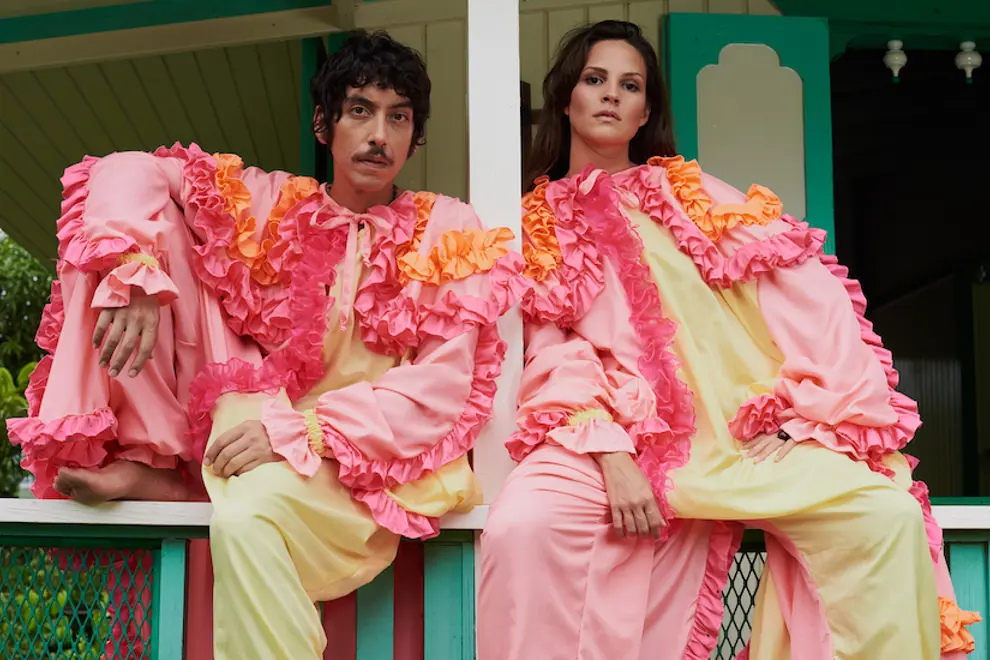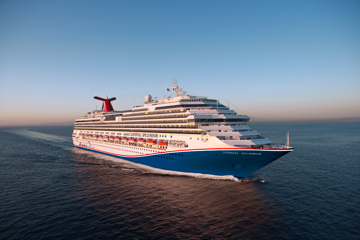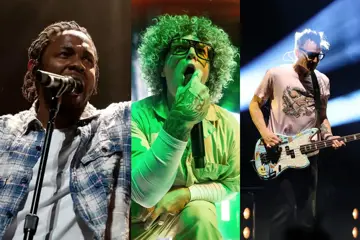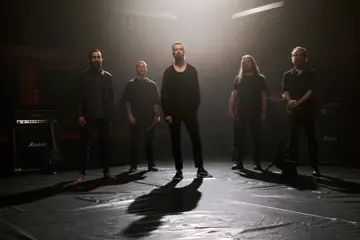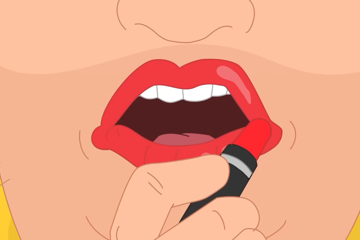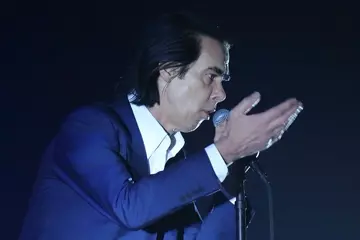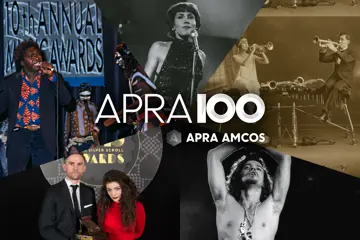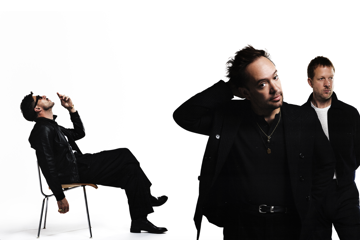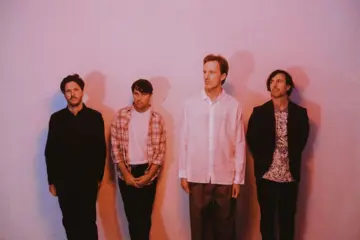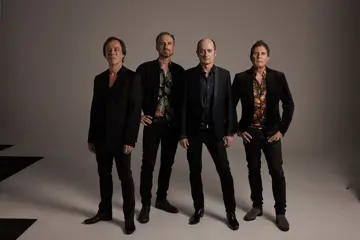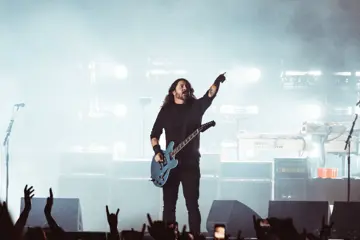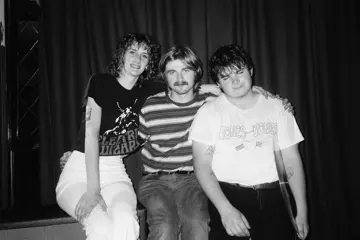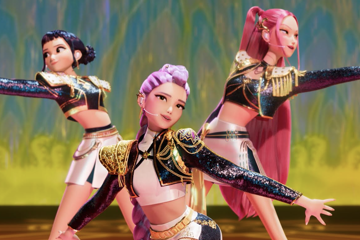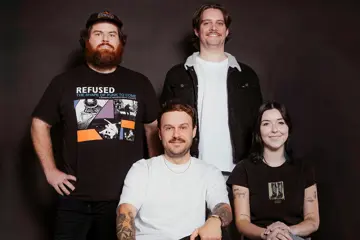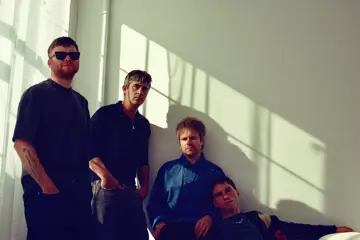Header image and all in-article images by Mara Corsino.
The feeling of longing for your homeland is either one that someone either feels every day, or one that someone completely doesn’t understand. For some people, there may never be a reason to leave where you’ve grown up; you can find work, settle down or do what you want to achieve in life without drifting more than a town over from your parental home. For others, particularly those raised in poverty or in the face of war, there isn’t a choice - moving across the world to Australia or the US is a necessary thing to survive, let alone get what you want in life.
In the case of the married Raquel Berrios and Luis Alfredo Del Valle, the pairing moved to New York City to further their careers in music, in a seemingly obvious move that led to their musical project Buscabulla tipped to become the next Latinx break-out act (and between highly acclaimed EPs and a Coachella performance, that they definitely became). However, after the devastation of hurricanes Maria and Irma, their longing for the homeland became overwhelming, and they were constantly thinking about everything they left in search of success - a longing to go back home and reconnect with their past.
Like so many others of the Puerto Rican diaspora, what Buscabulla faced returning home was a complex combination of emotions they’re still attempting to understand. On one hand, returning to your home can be extremely rewarding and self-fulfilling, especially to somewhere with culture as potent as Peurto Rico. It also gave them a sense of peace and quiet to raise their daughter, away from the bustling, near-manic nature of New York. On the other hand, however, is a sense of shock. Puerto Rico had changed since they left; people had moved on, family have moved out, and the culture that defined the island’s way of living was hurt, washed out by Hurricane Maria six months earlier.
Regresa, Buscabulla’s debut album, is one that attempts to piece together this complex network of emotions, written while the duo attempted to reconnect with their home. It’s rich with the potency of Puerto Rico, readapted into a modern era and combined with influences that stretch across the duo’s wide-ranging tastes. On the album-opening Vámono, for example, Raquel’s Spanish vocal weaves in and out of a marching snare, inspired by Peurto Rican marching bands at Beyoncé’s now-iconic Homecoming performance, which occurred the same year as Buscabulla’s debut at the event.
Don't miss a beat with our FREE daily newsletter
On the surface level, Regresa is thick with the duo’s admiration of Puerto Rican culture, from the rich percussive sounds that dance amongst their shifting vocals (which will continue to be sung in Spanish, despite a growing English-speaking audience), through to the rich artistry behind Vámono’s video clip, inspired by folkloric vejigante masks - which originate from Luis’ area within Peurto Rico - and the Festival de Las Mascaras, a long-standing tradition in Raquel’s life. “What we were really excited to do was go home and collaborate with people we had been admiring from afar [in New York],” the duo explain.
Deeper, the album is underpinned by the complexities of Puerto Rican life and the self-reflection and psychoanalysis of moving back home; a feeling of isolation and detachment one the duo felt profoundly, moving back after so long spent elsewhere. On Nydia, for example, Raquel reflects on a period of self-transformation - particularly central to motherhood and womanhood - while NTE (which stands for “no te equivoques” or, in English, “make no mistake”) carries the angst of the duo feeling like they’ve been misinterpreted; the pairing losing grip over their narrative as it becomes dictated by those that don’t understand the complexities of the duo’s history.
In many ways, Regresa is synonymous with the increasingly popular Puerto Rican musical flair. Despite the brooding emotions that often underpin it, its rhythms and melodies are joyful and celebratory; a somewhat natural byproduct of the Latinx music, and the carnival-coloured culture that gives its music that distinct flair. It’s not hard to lose yourself in the album, and at a time like now - where Puerto Rico and the rest of the world faces an unprecedented and unforeseen challenge - the displacement that works itself into the album’s core may actually give comfort through familiarity and relatability.
If you look at Regresa under the microscope, however, you find a bigger picture being painted; a transformative diary recollected piece by piece, that details the rushing emotions of the duo finding their feet back home again. “The album reflects the joys of being back but it’s also melancholic,” says Raquel. “You feel like a stranger in your own home because the island is going through very hard, weird times. Most people our age have fled. We have also changed after being away for so long.”
Things change and people change, especially so in the face of betrayal - which between natural disasters and national uprisings, Puerto Rico has faced a multiple of times in a multitude of ways. To come out the other side of facing this change so unexpectedly head-on comes with a lot of power, however, and this power makes Regresa quite the impactful listen.
Here, in the Puerto Rico home they’ve been isolating in for much of the past three months, Buscabulla’s Raquel Berrios and Luis Alfredo Del Valle break down their debut album, and the complexities that underpin its every rhythm.

There's a lot to talk about on this record, but I really wanted to start by getting a bit of context behind it, because from what I understand, a lot of this album is about returning - returning to Puerto Rico, returning to past cultures, returning to family - which all transpired after Hurricane Maria hit Puerto Rico in 2017. What were you thinking when you decided to make that move?
I [Raquel] was out in New York City for 10 years, and Luis was out there for maybe eight years. This is probably true for most Puerto Ricans, but once you leave, you really miss the island. There's something about Puerto Rico... I don't know if it's being from an island or just what it is like to just grow up here... but every time a Puerto Rican gets out of their island, they somehow become more Puerto Rican. There's really just like a sense of longing. It is sort of an island in the Caribbean and it is a really beautiful place with pretty decent weather most of the year, but I've probably dreamed about coming back even before our daughter was born, just because I felt like it was something I had to. It was just something that we always wanted to do.
It's hard to do that though, because Puerto Rico doesn't really have a bunch of resources and the economy's been bad for the past 10 to 15 years, so I think it's a place where probably everybody wants to be, but not a lot of people can be. Years past and we worked really, really hard to make it happen, both financially and emotionally. Then, once we saw an opening, we were like, “Let's just take the jump and let's just do it now, or else we'll never be able to escape the city.” It’s been a long time dream to come back.
I know the process of going back to where you’ve grown up can be very powerful, but it can also come with a lot of unforeseen emotions, both good and bad. How did you two feel once you started to settle back into Puerto Rican life again?
The interesting thing is that it was both really amazing, uplifting and blissful, yet at the same time, really confusing and weird and isolating. We were coming back to a place we haven't been in 10 years, so it changed. You see a bunch of people that you knew that lived here no longer anymore, and things that were once prosperous were not really looking that way. We had changed as well, like New York City really changes you, and in a weird kind of way, also maybe even makes you used to another type of living that clearly doesn't exist here in Puerto Rico.
It was an adjustment, an adjustment that we wanted to make but one that definitely took some time. Moving back, you felt lonely at the beginning while you get reacquainted with all the things that you left in the past, so it was equally blissful and melancholic. There’s always that weird divide between some comfort, and some dissonance when you move, whether it’s back to another country or just back to your parent’s house.
Was there a certain point in the move where you were like “Okay, this is what we should write our album about?”
We just started writing a bunch of songs, and I always feel that it's pretty cool because you're psychoanalysing yourself really, and it all happens quite naturally. I usually just start throwing words and melodies out and then before you know it, you think “Oh my god, I just wrote that.” It's a weird unconscious exercise that slowly reveals to you really what was in your mind. It's kind of beautiful in a way, like revealing a photograph or something. It's this thing that was there all the time, but it only comes out through whatever music you're making.
What we figured out is that it was a little bit maybe all over the place at the beginning; we were really trying to make things that were more out of our comfort zone, which is sort of what we were living in at the moment. While we were trying other sounds, I was trying other ways of singing, and things sounded a little more different and more evolved. Then, the more that we got into the record, the more we fell into a style that was a little bit more comfortable for us, or that we had tried before that felt good for us. There is sort of a timeline of emotions in the record - the songs are definitely chronological and show a process of us getting used to being back home - but it was something that built over time.
When it came to experimenting with different sounds and singing styles, do you think you had to have that shake up in your foundations - like moving back home - to start doing that?
Yeah, for sure. People say the best art comes when you're in an uncomfortable position, whether it be suffering or what have you. I just felt really excited because I know that whenever you do something new like a big move, it’s the best time to really express yourself because you're going to start to do things that you maybe haven't really done before. To me, to do something - like try new things - felt natural, because that's literally what was going on.

There’s a lot of cultural detail in this album, and in the clip for Vàmono for example, you hunted for seamstresses for ages for the outfits and floats. Do you think it was important to you guys to have things like this - these little cultural details - done correctly, by people who really understood the meaning and power behind it?
Yeah, 100 per cent. I think at some point, we had talked about maybe hiring somebody to help us do it, but even if we were to hire a wardrobe person or someone, we were still gonna definitely work with the authentic people. It was always our intention; we never really wanted to make anything that looks like it, but isn’t it.
I think what excited me the most was to actually come to Puerto Rico and collaborate with the people that I had been kind of admiring from afar. Just waiting to come back home and being like, “this is so exciting to me!” was really great, and seeing the celebration done back home, I even wanted to educate myself in how they did it or like how it was done and it was really beautiful. For that moment, we were able to enter the world of this more than 300-year-old celebration that had been passed generation to generation, and it's really cool how the techniques have evolved, and how the community comes together. The most important part was just seeing what this celebration means to people, because it's not really celebrated by everybody on the whole island - it is from a really specific place.
Videos are always tricky, but we always want to make videos that have a level of honesty, even though certain things are forced. It’s more authentic and there's an energy captured versus like, just hiring a bunch of people and recreating it.
Were there any other instances from working on this record that reflect on that as well, or hit close to home for you? All around, it feels like an album very centred around culture, no matter where you look - sound, video, what-not else.
The sound was a little bit tricky, because we live in such a digital world that collaborations and things mostly happen remotely, but we did get to have our friend Nick Hakim come over. I don't know if you know him, but he's a very talented singer that we had never really worked with before, and you can't really get [to see how other people work] other than by actually having them physically in your space. When you work on a record, you end up educating yourself too, especially when you work with other musicians. We really got to see how he goes about it, and how he sees music, which was really eye-opening for us - that’s the beauty of real-time collaboration.
But for most of the record, it didn't work like that sound-wise. We sample a lot, and we do a lot of digital production. In an ideal world, maybe at the beginning, I felt like, “Oh, maybe I can collaborate with this person and this percussionist and this other person,” but the reality is that it's so much more expensive and trickier to work that way, especially when you're on working on a low budget, bedroom-produced record. It's definitely something that we strive for and having more of that authentically honest face to face collaboration really was a high point for us this time around.
It’s interesting you point that out, because your past two EPs vary very differently in that space. You had one that had a lot of outside involvement - a label signed it, Dev Hynes worked on it with you, Converse invested in it - but your second EP was more DIY, and very self-built. Was there a battle between balancing those two sides for this record?
I think we did try a bit of both on this record. We were really open to working with Pat Wimberly, who’s formerly of Chairlift, to finalise the production on the record, and we worked another friend, Roberto [Carlos Lange], who did some production too. He did what was essentially an orchestral arrangement for one of the songs on the record. So, we did open ourselves up to that outside input, and we’re on a label that this will be put out through, and there are other factors at this point too. But it's always ultimately us, and we do things that we want to do and that we think we will enjoy, because that’s the guiding principle through it all in our eyes.
It’s your story, coming out under your name. You want it to still have you in it, even if you work with other people.
Exactly. I always like to tell people that there is a storyline to the album, if you listen to it from the beginning to end. It’s very us, and even though we’ve plucked out singles - because that’s how you put out an album - it’s very much intended to be a transformative diary type of thing. It’s all our feelings mapped out in order, I guess.
Is that what you want people to take away from the record?
Yeah, but you can never really control how people consume it, you know what I mean? But I think it's cool when artists suggest how you should listen to their record. I remember reading about somebody that made a record and she literally said, “This is a record for you to use in any way that you want. You can do yoga with it or your dishes - whatever.” There was something kind of interesting about that because even though I can consume the music in any way, the fact that the artist was suggesting something really stood out.
I'm sure people could probably just pick the songs they like, and that's it. But it is intended to be a journey. We underwent a journey in coming home, finding ourselves, refining ourselves and so on across this record, and it’ll be cool to people to come on this journey with us. But, if they want to make a playlist out of the songs they like and that’s it, so be it - that’s cool too.
Buscabulla's debut album, Regresa, is out now via Ribbon Music / Domino Music Australia.
Follow Buscabulla: FACEBOOK


